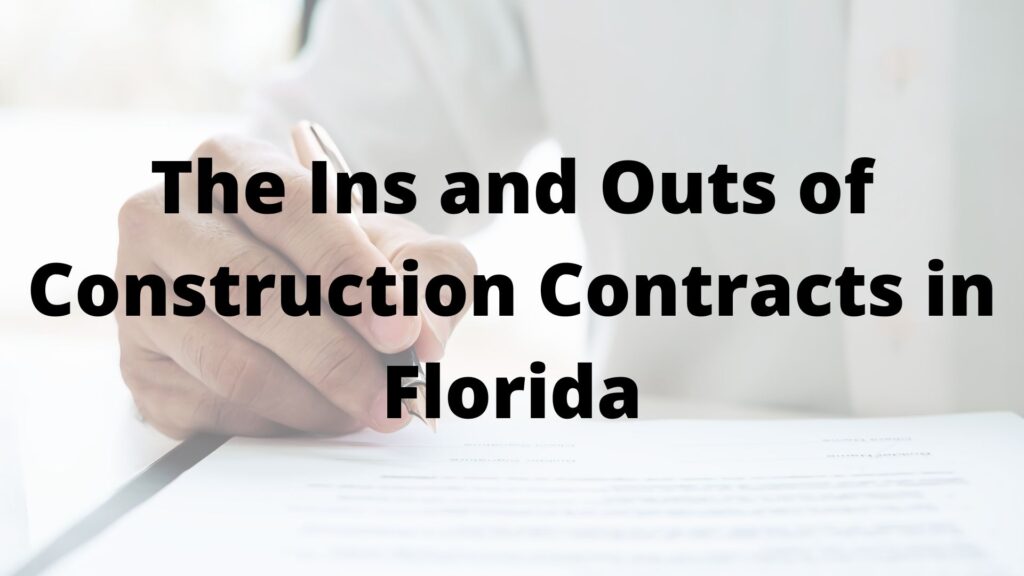
Florida’s booming construction industry relies heavily on well-crafted contracts to keep projects on track and protect all parties involved. From multi-million dollar commercial developments to residential renovations, understanding the nuances of construction contracts in the Sunshine State is crucial for owners, contractors, and subcontractors alike.
These aren’t just handshake deals; Florida law imposes specific requirements and important considerations that can significantly impact your rights and responsibilities. Let’s delve into the key aspects.
The Foundation: Essential Elements of a Florida Construction Contract
A solid construction contract in Florida, regardless of size or complexity, should always include the following fundamental elements:
- Identifiable Parties: Full names, addresses, and signatures of all parties involved (owner, contractor, etc.) are essential for a legally binding agreement.
- Clear Scope of Work: This is the blueprint for the project. It must meticulously detail the services to be provided, materials, quality standards, and any other specifications. Ambiguity here is a prime source of disputes.
- Project Cost and Payment Terms: Transparency is key. The contract should clearly state the total project cost, a detailed payment schedule (including milestones, due dates, and payment methods), and any conditions for payment. Florida’s prompt payment laws also set default timelines if the contract is silent.
- Schedule of Work: A realistic timeline for project completion, including start and completion dates, is vital. It should also account for potential delays (weather, owner-caused delays, material lead times) and outline procedures for time extensions.
- Authority: Clearly define who has the authority to make decisions and bind the parties legally throughout the project.
- Change Order Procedures: Construction projects rarely go exactly as planned. A contract must outline the process for requesting, approving, and pricing change orders to avoid costly disputes down the line.
- Warranties and Guarantees: Define the warranties provided for labor and materials, outlining their duration and scope.
- Dispute Resolution Mechanism: A clear process for resolving disputes (negotiation, mediation, arbitration, or litigation) can save significant time and money if disagreements arise.
Special Considerations: Florida’s Unique Legal Landscape
Florida law has specific provisions that set its construction contracts apart. Be aware of these critical requirements:
- Florida Construction Lien Law (Chapter 713, Florida Statutes): This is perhaps the most significant aspect. It grants a right to contractors, subcontractors, laborers, and material suppliers to place a lien on the property if they are not paid for their services or materials.
- Notice of Commencement: For projects over $2,500, owners are generally required to record a Notice of Commencement with the Clerk of the Circuit Court before work begins. This document provides essential information about the project and is crucial for protecting lien rights.
- Notice to Owner: Subcontractors and suppliers who do not have a direct contract with the owner must serve a “Notice to Owner” within specific timeframes to preserve their lien rights.
- Lien Waivers and Releases: Florida statutes explicitly prohibit contract clauses that attempt to waive lien rights upfront. Parties should exchange proper lien releases (partial or final) upon payment to ensure clear title.
- Construction Lien Law Disclosure: For residential contracts exceeding $2,500, a specific disclosure about Florida’s Construction Lien Law must be prominently included in the contract (no less than 12-point, capitalized, boldfaced type).
- Contractor’s License Number: Florida statutes require licensed contractors to display their license number on all contracts, estimates, proposals, and invoices.
- Construction Recovery Fund Disclosure: For residential projects over $2,500, a disclosure about the Construction Recovery Fund (which allows property owners to seek recovery for losses due to unlawful acts of state-licensed contractors) must also be included.
- “Pay-If-Paid” and “Pay-When-Paid” Clauses: Florida law generally enforces “pay-if-paid” clauses (where the general contractor’s payment to a subcontractor is conditional on receiving payment from the owner) and “pay-when-paid” clauses (which set a reasonable time for payment but don’t negate the underlying obligation). The exact wording of these clauses is critical.
Types of Construction Contracts in Florida
While the essential elements remain, the structure of construction contracts can vary based on project needs:
- Lump Sum (Fixed Price) Contracts: A single, fixed price for the entire scope of work. Common when the project scope is clearly defined.
- Unit Price Contracts: Payment is based on the quantity of work performed multiplied by a pre-determined unit price. Often used when quantities are uncertain at the outset (e.g., excavation).
- Cost-Plus Contracts: The owner reimburses the contractor for actual costs incurred plus a pre-agreed fee (either a fixed amount or a percentage of costs). Useful for projects with an undefined scope or high uncertainty.
- Cost-Plus with a Guaranteed Maximum Price (GMP): A variation where the contractor guarantees the total cost will not exceed a specified maximum, shifting some risk back to the contractor.
- Time and Materials Contracts: Similar to cost-plus, but typically for smaller projects or repair work where the contractor is paid for actual hours worked and materials used, often with a markup.
- Design-Build Contracts: A single entity is responsible for both the design and construction of the project, fostering greater collaboration.
When Things Go Wrong: Breach and Disputes
Even with a well-drafted contract, disputes can arise. Common construction contract disputes in Florida include:
- Non-payment or underpayment
- Scope of work disagreements (especially regarding change orders)
- Delays and scheduling conflicts
- Defective construction claims
- Contract termination issues
Remedies for a breach of contract in Florida construction law can include:
- Damages: Monetary compensation to make the non-breaching party whole. This can include compensatory damages (direct losses), liquidated damages (pre-agreed amounts for specific breaches), and, in rare cases, exemplary damages.
- Repudiation/Rescission: Termination of the contract, aiming to return parties to their pre-contractual state.
- Specific Performance: A court order requiring the breaching party to fulfill their contractual obligations.
The Importance of Legal Counsel
Given the complexities of Florida’s construction laws, especially regarding liens and statutory disclosures, consulting with an experienced Florida construction law attorney is highly recommended. A lawyer can help you:
- Draft and negotiate contracts that protect your interests.
- Ensure compliance with all Florida-specific regulations.
- Understand your rights and obligations under the contract and Florida law.
- Navigate disputes and explore appropriate resolution mechanisms.
By understanding these ins and outs, you can lay a stronger legal foundation for your construction projects in the vibrant Florida market. To learn more about construction contracts in Florida, contact us today.
 John Caravella Esq., is a construction attorney and formerly practicing project architect at The Law Office of John Caravella, P.C., representing architects, engineers, contractors, subcontractors, and owners in all phases of contract preparation, litigation, and arbitration across New York and Florida. He also serves as an arbitrator to the American Arbitration Association Construction Industry Panel. Mr. Caravella can be reached by email: [email protected] or (631) 608-1346.
John Caravella Esq., is a construction attorney and formerly practicing project architect at The Law Office of John Caravella, P.C., representing architects, engineers, contractors, subcontractors, and owners in all phases of contract preparation, litigation, and arbitration across New York and Florida. He also serves as an arbitrator to the American Arbitration Association Construction Industry Panel. Mr. Caravella can be reached by email: [email protected] or (631) 608-1346.
The information provided on this website does not, and is not intended to, constitute legal advice; instead, all information, content, and materials available on this site are for general informational purposes only. Readers of this website should contact their attorney to obtain advice with respect to any particular legal matter. No reader, user, or browser of this site should act or refrain from acting on the basis of information on this site without first seeking legal advice from counsel in the relevant jurisdiction. Only your individual attorney can provide assurances that the information contained herein – and your interpretation of it – is applicable or appropriate to your particular situation. Use of, and access to, this website or any of the links or resources contained within the site do not create an attorney-client relationship between the reader, user, or browser and website authors, contributors, contributing law firms, or committee members and their respective employers.
